Pupil & teacher: Mark Cavendish interviews Rod Ellingworth
Procycling's 2019 guest editor spoke to his former mentor and current boss about what sets him apart

Rod Ellingworth is a rider turned coach, who launched the British Cycling Academy for U23 riders in 2004, in which a young Mark Cavendish was one of his first students. He helped launch Team Sky in 2010 and, after nine years with the team, he left this year to become team principal at Bahrain McLaren, where he’s been reunited with Cavendish.
In 2019, Cavendish guest edited an issue of Procycling magazine. Among the subject matters he wanted to cover was an interview with his former coach and mentor, Rod Ellingworth.
This article was taken from Procycling magazine issue 251, January 2019.
Mark Cavendish: We’ve known each other for a long time and we’re mates, though it didn’t start like that. You’re one of the most influential characters in British Cycling. You’re one of the hardest working, but one of the least recognised and publicly applauded. Is that something you want? What drives you to put everything in that you do?
Rod Ellingworth: A little example. We’re here on a camp in Mallorca. The riders don’t get here until Monday; I’ve been here since Wednesday. We’ve got staff coming today but we’re in a new hotel and I wanted to be here two days early. I want the camp to be good and run really, really well. If I leave it late to come in and get panicky or stressy, I’d feel really bad. For me, it’s about the self-discipline of wanting it to go well, I’m ambitious for it to be a good camp. I want the feedback to be that there were no issues, but I’m running around like a blue-arsed fly, getting stuff done.
MC: Do you get the positive feedback? I know that with cyclists, sometimes you only get the negative.
RE: It doesn’t bother me if people don’t say anything but I judge it myself, and if there are no major mess-ups then that is the success. If people are in the right place at the right time and nobody is complaining about anything big, that’s it for me.
Get The Leadout Newsletter
The latest race content, interviews, features, reviews and expert buying guides, direct to your inbox!
But going back to when we started at the Academy there were two things. One, we loved the sport. It’s special to be able to work in the sport. Secondly, I like to do a good job and commit to things. To help young guys to do something in their career – what better job is there to have? That’s what I’ve always wanted.
When I was racing out in France, even though I was the foreigner in the team I raced for, I ended up being the person whose house everybody met at and I took all the rides out. I liked that. It was challenging in the mid-1990s with things that were happening in the sport and me getting my head kicked in every week, and thinking, what’s going on and people around me doing the wrong things. But I liked helping people. When I came back to Britain I was rooming and racing with Bradley [Wiggins] before he turned pro – I enjoyed being road captain and helping the lads race.
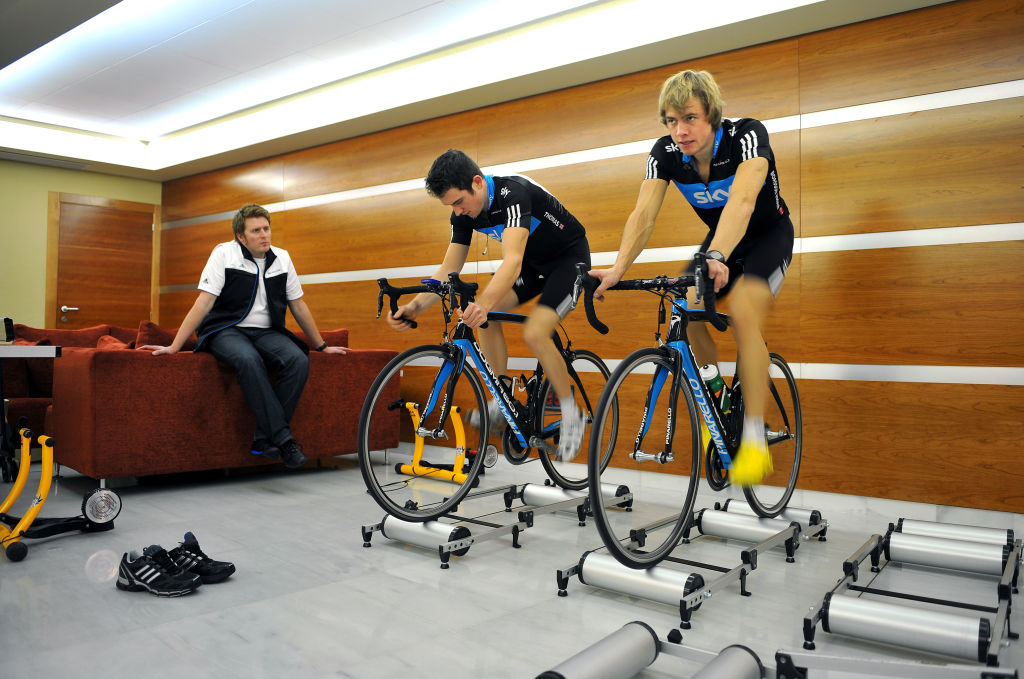
MC: You’re a leader, but you do it in a different way to me. Or how Brad does it. You have this look where you’re not angry, you’re disappointed, and it’s horrible. I’m still terrified of disappointing you.
RE: I believe you’ve just got to be yourself and do things your own way. At the time, I really bought into the British Cycling method of not beating people to death with stuff. Within BC we had a talented group of bike riders and it’s our job to make the best of them. We’re not there to judge them. In the pro world, if somebody pisses you off you can just get rid of them. There are hundreds out there who could maybe do the same thing. But within BC we only have a certain pool of riders. Before the Academy started in January 2004, part
of what I wrote up about it to present to people was that we don’t really know about these young lads. We know there is talent. But there was no tracking method. I just had a hunch about a group of young lads that if they were in the right vehicle with the right support, why can’t they perform?
MC: The first Academy group. Was it down to you getting the best out of us?
RE: This is one of my main drives. I did it the old-school way – I disappeared to France eight months of year, then Australia and Spain, and I did that year after year just to get by. There was no coaching, nobody really helped but I always believed British riders could
be as good as anybody else. We don’t have the climate or the climbs, but we’re tough characters. I always had that drive. I didn’t worry too much in the first couple of years about the actual talent but I was going to concentrate on setting it up out there. Get the basic things right, like discipline and work ethic. I was the first employee at BC for a while who didn’t have a sports science degree or a physiological background. Dave Brailsford took a bit of a punt with me. I felt it was about getting the simple things right.
My thought was when you get on the bike, you know what you are doing every single day and why you are doing it. And everything has to relate to bike racing. Being out there, fighting and not giving people an inch on the road, that to me is everything. It doesn’t matter what numbers you produce in training. I had that different concept on how to train – it was all about racing. And as young kids you were playing cycling. When you are a kid, in your head you are riding the Tour or Paris-Roubaix and I used to try and do that with the young riders. Let’s play bike racing every day.
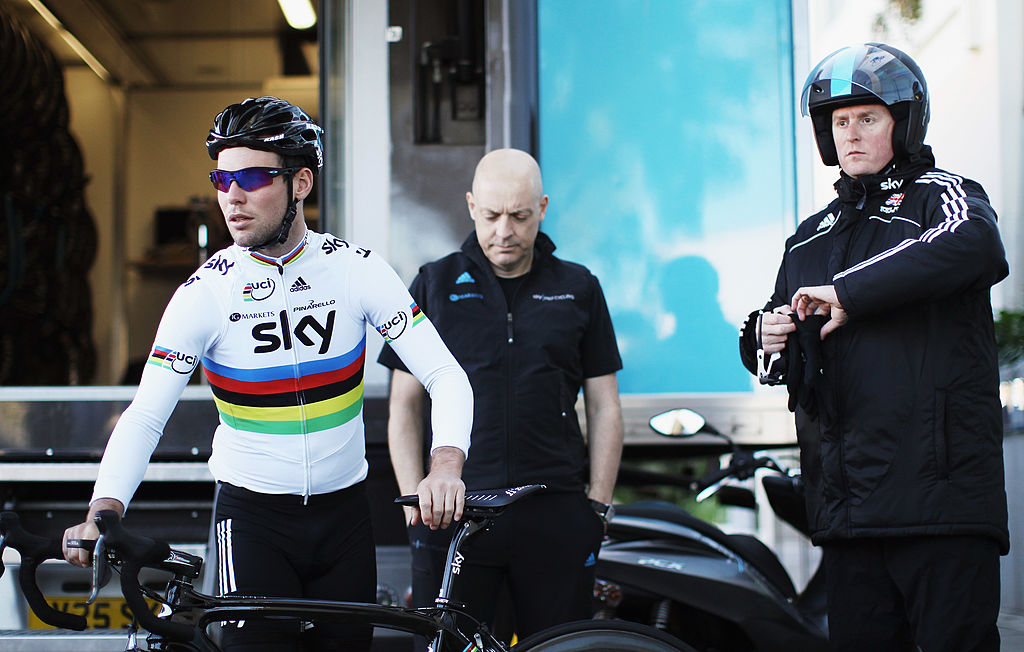
MC: Do you see a difference in the lads now to 15 years ago?
RE: It’s massively different now. What we should be studying is what kids are going to be like in 10 years’ time. We’re only getting older. The gap gets bigger and technology grows. My three-year-old daughter can FaceTime me on her own. It’s nuts. Things move on and coaches have to move with the times and recognise people are different.
MC: Do you have Instagram?
RE: No. I don’t have Instagram, Facebook or Twitter. I can’t be bothered to fill my life with it. I feel like I’m wasting my life doing stuff like that! Now, 18-year-old lads are different to 15 years ago. Mainly in the way we communicate. Are people doing things face-to-face so much? Not as much as before but as a coach you have to keep that element. Face-to-face is an essential part of coaching. I used to spend 11 months a year with you guys, with you every single day. That was essential to make it work.
MC: Is it harder to spend time on the road now you have a family?
RE: It gets hard. When I left this week my daughter was crying her eyes out. But the bottom line is, it’s my job. I don’t know what else I’d do! For me, I couldn’t have thought of anything better to do than what we did. It was brilliant and I loved every minute of it, even when you lads wound me up. Like when you flooded the hotel in Australia... In 2006 we moved to Italy. You were coming from Germany to race with us, and I remember when you were sick at the Baby Giro. I had to drive you three hours from Napoli – it made me tired the next day, but that’s what you have to do for people. The amazing thing is that we were racing like that in 2006 and then in 2007 you were racing the Tour de France. That’s crazy, to think about where you were.
When I presented the programme to Peter Keen, Dave Brailsford, John Herety and Doug Dailey it was mid to late 2003 at the velodrome. Peter wasn’t sure – he said it was Olympic year and we didn’t want to take focus away. I said, ‘I won’t even bother you guys. Just give me a budget and I’ll crack on with it.’ Dave went for it, and in 2005, after you’d won the Madison Worlds, Peter rang me and said, ‘I can’t believe what you’ve done there. Fantastic work.’ You and Ed [Clancy] won world titles.
The other thing I did was make sure we were advertising as much as possible what you guys were doing. I used to get in touch with Cycling Weekly to get the results up because I wanted other 14 or 15-year-olds to want to do it.
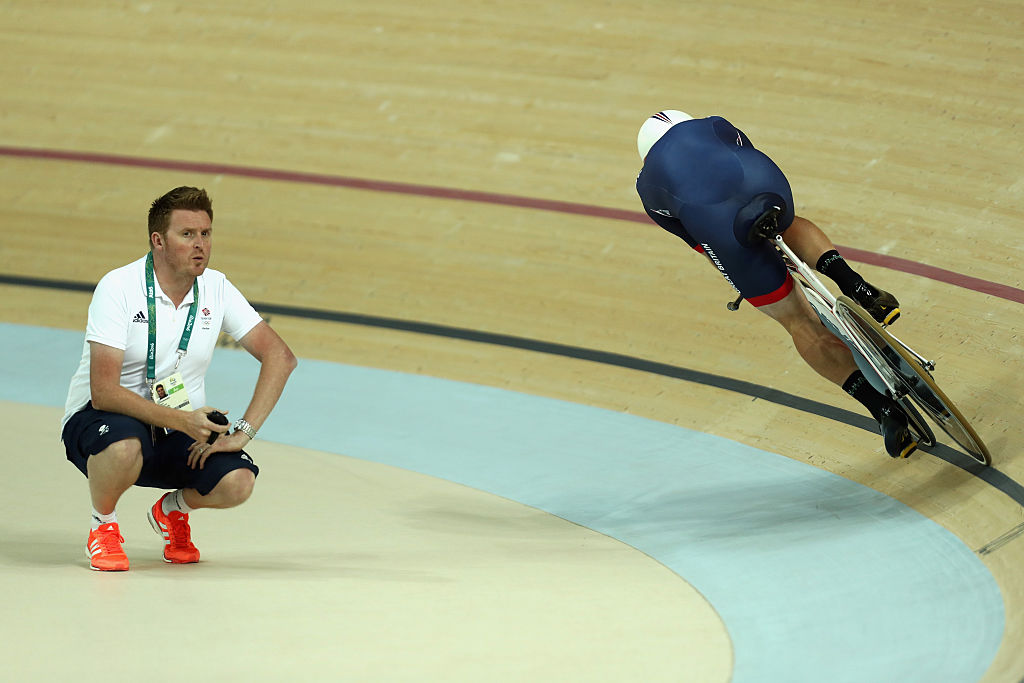
MC: Has the attitude changed? I don’t want to come across all ‘In my day’ but do kids think it’s a given that the programme means they’ll turn pro?
RE: Some people think it’s a series of steps and if you do one, two, three and four you’ll make it. But there’s more to it than that. There’s a process. I had a checklist in the background of things you had to learn, you’ve got to do so many hours of through-and-off in a group, you’ve got to have done coming back for bottles. I made sure before you turned pro, trying to get you so you knew how to sit on the front of a peloton or to lead out, to take bottles and feed bags. All the basic stuff.
MC: You always made us carry on racing and not give up…
RE: I believe, unless you have crashed or are sick, at that age you should always try to finish the stage race. To get through the race, even if you do get your head kicked in.
MC: Something I’ve noticed in the last couple of years is how quickly people fuck off when you’re not winning. One of the first training rides we ever did, on Gun Hill, I’d just come out of the bank and everyone was kicking my head in. You could have just thought I was useless, which most coaches would do, but you put more into me. People see the success you’ve had but they don’t see that.
RE: One of the little moments I had was with Ross Sander. Super talented kid. Fast. I remember him near enough whipping round you on the track in a sprint in Newport. He had that seated acceleration like Rob Hayles, when he really got on top of the gear and just go. He was super-talented but it was a bit messy at home, he didn’t know his dad.
I took him to the LA World Cup then kept them for a training camp down in San Diego. Ross was really struggling with his life, living at home with his mum and step-dad, wasn’t happy. He knew his dad was in New York and he went to find his dad. I took him to the airport in San Diego and I knew in that moment I was never going to see that kid again. I said to him, Ross, you owe nobody anything – go and be who you want to be. You’re going to meet your dad for the first time in years.
I never saw him again but I got a letter from him a few years later. He’d joined the US army and he said to me, ‘I just want to thank you for everything you did. The start you gave me at that moment was the biggest thing anybody has ever done for me.’ He didn’t succeed in the way that you guys did, but actually that gave me as much satisfaction.
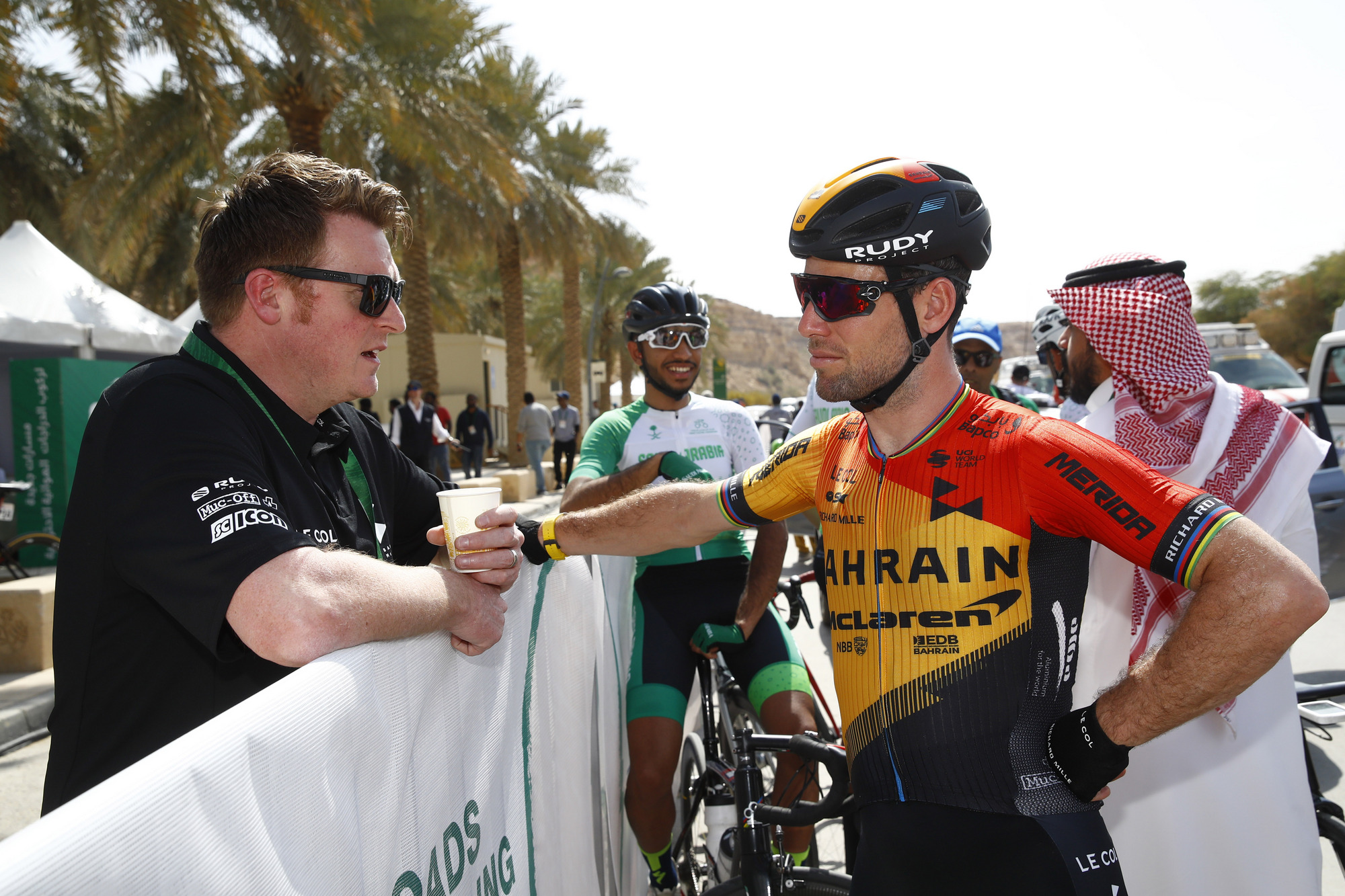
Procycling: What we’ve noticed is that it’s hard to define what your job is, Rod. You don’t replace anybody like for like, and nobody replaces you. You’re not exactly the coach, or the DS or trainer or manager. You’re Rod Ellingworth. So what would you describe your job and strengths as?
MC: You answered the question. His job is Rod Ellingworth!
RE: Some people might say I’m the general dogsbody. At the Academy I was coaching, DSing, managing, doing the budgets, all the planning for taking lads around the world for a year. You’ve got to be the father figure, friend, brother type, or whatever each rider needs – you have to be that person.
I did a lot of courses at BC to learn how to deal with people. Keeping patience, and not letting things affect you, and I’ve been lucky to experience lots of different areas. I can deal with the media, I can motor-pace, I can jump in the car and be a second or lead DS. I can manage the team, or go and talk at board level at Sky if I have to. Basically, don’t box me into a corner and keep me broad. It’s about the whole organisation so I purposely don’t box myself and I hate job descriptions.
MC: You do a job to do the job. I’ve never known you to do the minimum.
RE: I’ve just been moving tables around in the hotel here to get the boardroom ready where we’ll do our performance meetings. I want to get it right. I’ve come out early to do things like that, to get it done. I don’t want somebody else to do it for me – I’ll just do it for myself. It’s hard to say what I actually do. I always say to Dave B, don’t put a big job title on me. I’m performance director of the team but it doesn’t bother me what the title is.
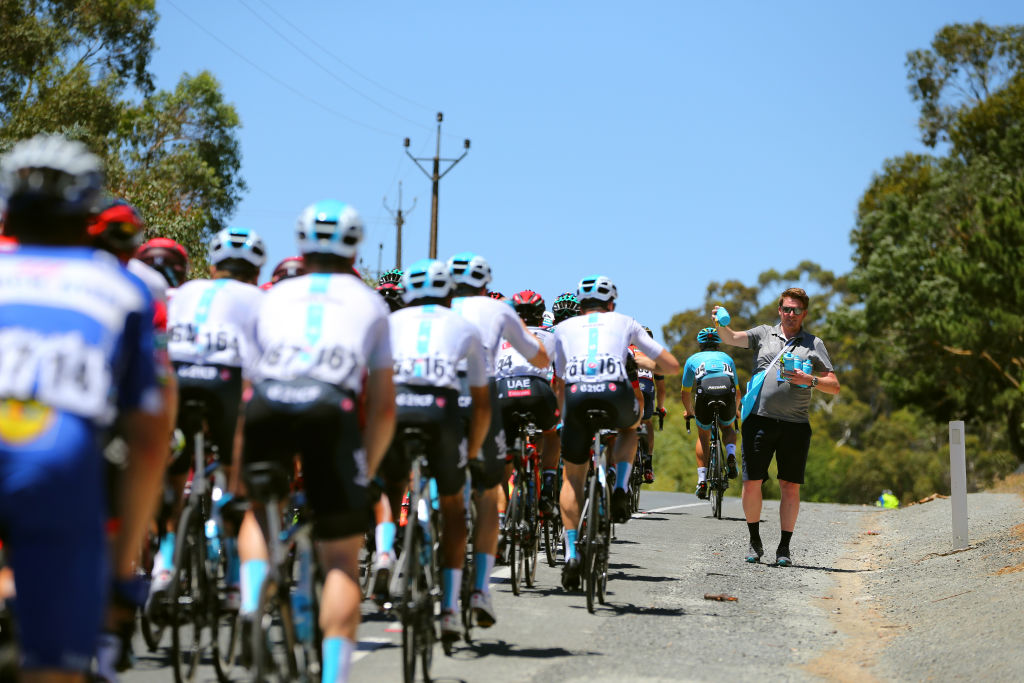
Procycling: Tell us about waiting for Mark at the Tour de France in 2018, Rod, when he faced elimination in the Alps from the time cut.
RE: I was ahead of the race, doing the recon. I had race radio and I could hear Mark was getting further behind. At one point I saw one of the guys from his team and we said, ‘I don’t think he’s going to make it.’ But I had this feeling, I knew you were going to finish. I had the thrill of seeing G [Geraint Thomas] win his first stage like that. But in my gut I knew I had to go and show support. For Mark, after what he’d been though the last 18 months, it was a hard day. He was exposed and on his own, and it’s not flipping easy.
MC: I get goosebumps now talking about it, but it’s something that you instilled in us. Seeing you there was emotional. You work for Sky and you had won so you could have f*cked off and drunk champagne, but you waited an hour. That was special.
RE: I knew it was a big moment for you. I didn’t know that Dave Millar was blogging about it. He asked if he could take photos of me. I said, whatever, and the next thing, people were linking to his blog. I was just thinking, what’s all this sh*t?
It was unique to have G win and you back there. I remember telling you about learning to ride in the back group – it’s part of the sport. I don’t think development groups are doing that at the moment. I don’t think they truly teach people all the elements – do they teach the sprinters how to survive in the mountains?
MC: I think they don’t teach cycling. It’s about what watts you can do, and power. But you don’t learn how to race.
RE: When you won Milan-San Remo, I knew your sprint was the best in the world, so your finish line was at the top of the hill. How do you do that? How do you get to that moment? What does it look like? What does it feel like? It’s about surviving the climb, and that’s it.
MC: The efforts you had me doing before San Remo weren’t sprint efforts. It was all accelerating out of hairpins. You taught us how to be bike racers.
RE: That’s what it’s all about. It all worked out in the end, didn’t it?
Procycling’s August 2020 issue is out to buy now, featuring 21 stories from the Tour de France, including interviews with Romain Bardet, Tejay van Gardren, Robbie McEwen, David Millar, Merharwi Kudus, Nicolas Roche and Michael Matthews and more.
Procycling magazine: the best writing and photography from inside the world’s toughest sport. Pick up your copy now in all good newsagents and supermarkets, or get a Procycling print or digital subscription, and never miss an issue.
Follow @Procycling_magazine